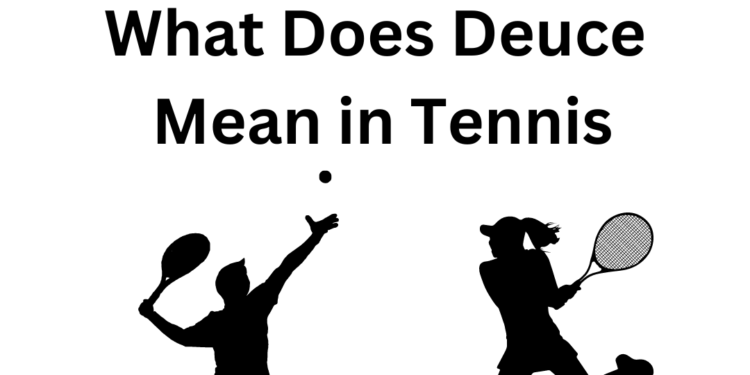What Does Deuce Mean in Tennis
In Tennis, “Deuce” refers to a situation where both players or teams score 40-all (also known as 40-40). It occurs when both sides have won three points each in a game. Unlike other sports, tennis does not rely on a simple numerical progression in scoring but rather uses a distinctive sequence.
Origins of the Term “Deuce”
To understand the term “deuce,” we must explore its historical roots. The word “deuce” derives from the Old French word “Deus,” meaning “two.” In the early days of tennis, which originated in medieval Europe, the scoring system evolved from the French game of paume. This system utilized terms like “love” and “deuce” to represent specific scores, with “deuce” signifying a tie between players.
The transition from Advantage to Deuce
When the game reaches “deuce,” it enters an intriguing phase. A player must score two consecutive points to win a game from deuces. The player who wins the first point after the deuce earns the advantage, putting them one step closer to winning the game. However, if the opponent wins the subsequent point, the game returns to deuce, prolonging the battle.
Strategies for Winning the Deuce
Players employ various strategies to gain the upper hand as the stakes rise at deuce. Serving accurately, mixing up shots, and capitalizing on opponents’ weaknesses are vital tactics. Maintaining composure and handling pressure becomes crucial, as the outcome of a game can swing dramatically at deuce.
Psychological Impact of the Deuce
The deuce stage of a game often introduces a psychological battle between competitors. It’s a moment where mental grit, focus, and resilience come into play. The pressure to seize the advantage can lead to heightened tension, mind games, and tactical adjustments as players strive to outsmart and outlast their opponents.

Battles in Tennis History
Throughout tennis history, memorable deuce battles have captivated audiences and showcased the intensity of this pivotal stage. One such iconic encounter occurred in the 1980 Wimbledon Men’s Final between Bjorn Borg and John McEnroe. The match featured several extended deuce games, with both players displaying exceptional skill and mental resilience. Such battles testify to the drama and excitement that deuce moments can bring to the sport.
Deuce in Doubles Matches
The concept of deuce extends beyond singles matches and applies to doubles matches. The score reaches a deuce in doubles when both teams have won three points each in a game. Like singles match, the team that secures two consecutive points after the deuce gains the advantage. The dynamics of teamwork, communication, and coordinated strategies add complexity to deuce situations in doubles.
Deuce in Professional Tennis Tournaments
Deuce plays a significant role in professional tennis tournaments, where matches can be highly competitive and closely contested. Players participating in these tournaments must be well-versed in handling deuce moments and capitalizing on opportunities to gain an advantage. The ability to consistently perform under pressure and win crucial deuce points can determine a player’s success in a tournament.

Deuce as a Symbol of Equality in Tennis
Beyond its scoring implications, the deuce holds symbolic value in tennis. The term represents a state of equality between players, where neither has an advantage. It embodies the fair and level playing field that tennis strives to create, emphasizing the importance of skill, strategy, and mental strength in determining the outcome of a match.
Common Misconceptions about Deuce
There are some misconceptions associated with deuce that are worth addressing. One common misconception is that the deuce signifies a tiebreaker situation. However, deuce and tiebreaker are distinct terms and refer to different stages of a tennis match. A deuce pertains to the scoring within a single game, while a tiebreaker is a specific game format used to determine the winner of a set.
Deuce in Tennis Slang and Pop Culture
Tennis terminology, including “deuce,” has entered everyday conversation and pop culture. Outside the tennis court, “deuce” is sometimes used colloquially to describe a situation that is evenly balanced or deadlocked. Its usage in popular culture reflects tennis’s widespread recognition and influence as a sport.
Deuce as a Metaphor for Life
Beyond its significance in tennis, “deuce” can be seen as a metaphor for the ups and downs of life. Just as players experience the ebb and flow of fortunes during deuce moments, life often presents us with challenging situations where victory and defeat hang in the balance. The ability to persevere, adapt, and seize opportunities at crucial junctures echoes the spirit of the deuce in tennis.
Conclusion
In conclusion, “deuce” is a fundamental concept in tennis that represents a tie in scoring between players. It marks a crucial stage where strategy, mental fortitude, and skill are tested. Deuce battles have produced some of the most exhilarating moments in tennis history, captivating fans worldwide. Understanding the intricacies of deuce and its implications enriches our appreciation of this beloved sport.
FAQs
Q1: Can a deuce occur in every game of a tennis match?
A: Yes, a deuce can occur in any game where players or teams score 40-all.
Q2: How long can a game stay at deuce?
A game can potentially stay at deuce for an indefinite number of points. It requires one player or team to win two consecutive points to break the deuce and win the game. As a result, the duration of a deuce game can vary depending on the players’ skills, strategies, and ability to handle the pressure.
Q3: Is deuce only relevant in tennis, or is it also used in other sports?
A: “deuce” is primarily associated with tennis and its unique scoring system. While other sports may have tiebreaker situations or moments of equal scoring, they may use different terminology to describe those scenarios.
Q4: What happens after a game is won from a deuce?
A: After a player or team wins a game from a deuce, the score resets and a new game begins. The process repeats throughout the match until one player or team emerges as the winner.
Q5: Does deuce impact the overall outcome of a tennis match?
A: Deuce moments can significantly impact the outcome of a tennis match. Winning crucial deuce points can swing the momentum in a player’s favor and ultimately determine the result of a game, set, or entire match.
Q6: Can the term “deuce” be used in a metaphorical sense outside of tennis?
A: While “deuce” is primarily used in a tennis context, it can be metaphorically applied to describe situations in life or other domains where there is a state of balance, deadlock, or equal footing between opposing forces or parties.











